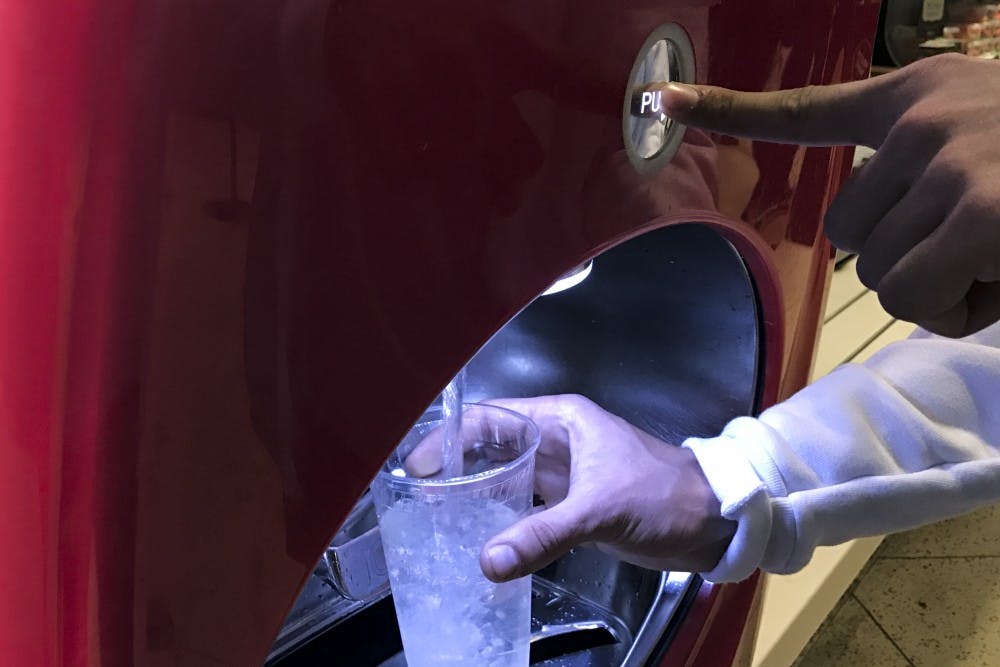Students at Temple University may have to swallow the cost of Philadelphia’s soda tax through an increased meal plan cost — but Penn has no plans to go a similar route.
During a phone conference on March 14, Temple’s trustees proposed raising the cost of meal plans by an additional 6 percent, 4.8 percent of which will offset the 1.5 cents per ounce tax on beverage-sweeteners, The Philadelphia Inquirer reported. Temple later promised to “reconsider” the fee after Mayor Kenney spokesperson and 2013 College graduate Lauren Hitt argued the tax was being used as a “scapegoat” for other expenses. Still, the possibility remains that Temple students will be shouldering the higher cost come next fall.
A soda tax fee isn’t something students should expect to see at Penn. Director of Business and Hospitality Services Pam Lampitt said Penn, like Temple, is now paying significantly more for the sweetened drinks available at dining halls. But Lampitt says the prospect of a raise in costs for students was never mentioned.
“In the incorporating of our increases that the trustees allow us to increase incrementally, we did not factor in any additional plea to say ‘hey, we got this really big soda tax,’” Lampitt said. “We did not do that, we chose not to do that, and we would not do that.”
Lampitt’s assurance does not mean students won’t encounter any additional soda-related costs. Penn Dining has allowed Bon Appetit —which oversees on-campus retailers like Frontera, Gourmet Grocer, Houston Market and Beefsteak — to raise the prices of sweetened drinks.
“[Penn] has incrementally allowed Bon Appetit to increase some of their pricing,” Lampitt said. “They’re not passing along a hundred percent of it [to students], but passing along some of it ... based upon what’s happening in the immediate area.”
Wakefern Food Corporation Vice President of Retail Marketing Karen Meleta had to raise the price of nearly 4,000 sweetened items when the tax was introduced this January. At the University City Fresh Grocer, which is a Wakefern subsidiary, prices on common goods like Silk almond milk, Minute Maid lemonade and Arizona iced tea cost about 30 percent, 45 percent and 50 percent more, respectively.
College freshman Nicole Posadas is still occasionally stunned by the new costs.
“I actually tried to buy a soda last weekend [from a vending machine], and I completely forgot there was a tax,” Posada said. “I ended up not buying the soda. The price went from like $1.25 [before the tax] to $2.05 now.”
Wharton professor Benjamin Lockwood says these price increases could result in an overall social benefit. Despite dampened sales causing companies like Pepsi to lay off workers, early data suggest the tax has reduced how many sugary beverages people are drinking.
“There have been some reports that consumption has decreased, some of them saying by pretty substantial amounts. I’ve seen blog posts and news articles saying in the order of 25 or 30 percent,” Lockwood said. “A policy maker would say, ‘yes, it’s very unfortunate for those people who no longer have jobs, but that cost to them is outweighed by ... the predictable health benefits of reduced soda consumption.’”
The tax seems to be having at least a mild influence on Penn students. Posadas, for one, has made some adjustments.
“I never drank that much soda, Posada said. “But now I’m drinking even less soda knowing that there’s the tax.”









